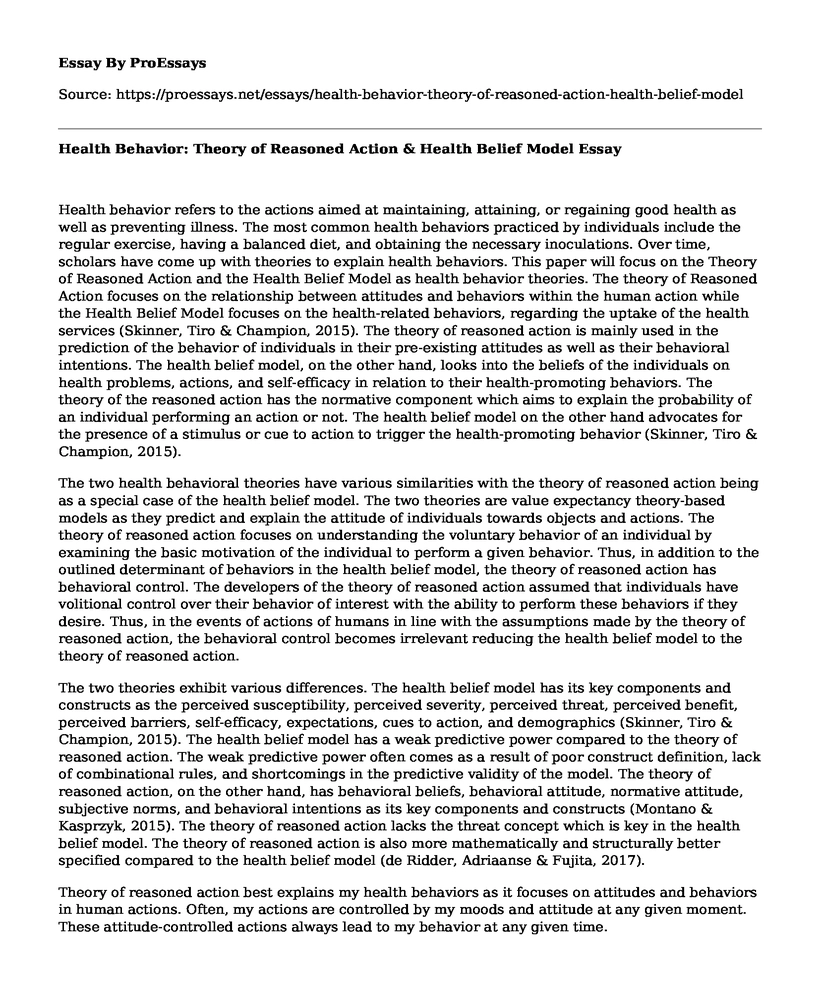Health behavior refers to the actions aimed at maintaining, attaining, or regaining good health as well as preventing illness. The most common health behaviors practiced by individuals include the regular exercise, having a balanced diet, and obtaining the necessary inoculations. Over time, scholars have come up with theories to explain health behaviors. This paper will focus on the Theory of Reasoned Action and the Health Belief Model as health behavior theories. The theory of Reasoned Action focuses on the relationship between attitudes and behaviors within the human action while the Health Belief Model focuses on the health-related behaviors, regarding the uptake of the health services (Skinner, Tiro & Champion, 2015). The theory of reasoned action is mainly used in the prediction of the behavior of individuals in their pre-existing attitudes as well as their behavioral intentions. The health belief model, on the other hand, looks into the beliefs of the individuals on health problems, actions, and self-efficacy in relation to their health-promoting behaviors. The theory of the reasoned action has the normative component which aims to explain the probability of an individual performing an action or not. The health belief model on the other hand advocates for the presence of a stimulus or cue to action to trigger the health-promoting behavior (Skinner, Tiro & Champion, 2015).
The two health behavioral theories have various similarities with the theory of reasoned action being as a special case of the health belief model. The two theories are value expectancy theory-based models as they predict and explain the attitude of individuals towards objects and actions. The theory of reasoned action focuses on understanding the voluntary behavior of an individual by examining the basic motivation of the individual to perform a given behavior. Thus, in addition to the outlined determinant of behaviors in the health belief model, the theory of reasoned action has behavioral control. The developers of the theory of reasoned action assumed that individuals have volitional control over their behavior of interest with the ability to perform these behaviors if they desire. Thus, in the events of actions of humans in line with the assumptions made by the theory of reasoned action, the behavioral control becomes irrelevant reducing the health belief model to the theory of reasoned action.
The two theories exhibit various differences. The health belief model has its key components and constructs as the perceived susceptibility, perceived severity, perceived threat, perceived benefit, perceived barriers, self-efficacy, expectations, cues to action, and demographics (Skinner, Tiro & Champion, 2015). The health belief model has a weak predictive power compared to the theory of reasoned action. The weak predictive power often comes as a result of poor construct definition, lack of combinational rules, and shortcomings in the predictive validity of the model. The theory of reasoned action, on the other hand, has behavioral beliefs, behavioral attitude, normative attitude, subjective norms, and behavioral intentions as its key components and constructs (Montano & Kasprzyk, 2015). The theory of reasoned action lacks the threat concept which is key in the health belief model. The theory of reasoned action is also more mathematically and structurally better specified compared to the health belief model (de Ridder, Adriaanse & Fujita, 2017).
Theory of reasoned action best explains my health behaviors as it focuses on attitudes and behaviors in human actions. Often, my actions are controlled by my moods and attitude at any given moment. These attitude-controlled actions always lead to my behavior at any given time.
References
de Ridder, D., Adriaanse, M., & Fujita, K. (2017). Self-control in health and well-being: Concepts, theories, and central issues. In Routledge International Handbook of Self-Control in Health and Well-Being (pp. 1-7). Routledge.
Montano, D. E., & Kasprzyk, D. (2015). Theory of reasoned action, theory of planned behavior, and the integrated behavioral model. Health behavior: Theory, research and practice, 70(4), 231.
Skinner, C. S., Tiro, J., & Champion, V. L. (2015). Background on the health belief model. Health behavior: Theory, research, and practice, 75.
Cite this page
Health Behavior: Theory of Reasoned Action & Health Belief Model. (2023, Feb 06). Retrieved from https://proessays.net/essays/health-behavior-theory-of-reasoned-action-health-belief-model
If you are the original author of this essay and no longer wish to have it published on the ProEssays website, please click below to request its removal:
- Challenges Experienced by International Nursing Students Essay
- Research Paper on Baumrind's 4 Parental Styles
- Paper Example on Fall Prevention in Older Adults: Assessing the Economic Burden
- Essay on Booker T. Washington: Advocating for African Americans After Emancipation
- Paper Example on Word Processors: Revolutionizing Business Communications
- Essay Example on EQ vs. IQ: Comparing & Contrasting Two Concepts
- Essay Example on Exploring Positive Youth Justice: Assessing Claims of Uniqueness and Robustness







